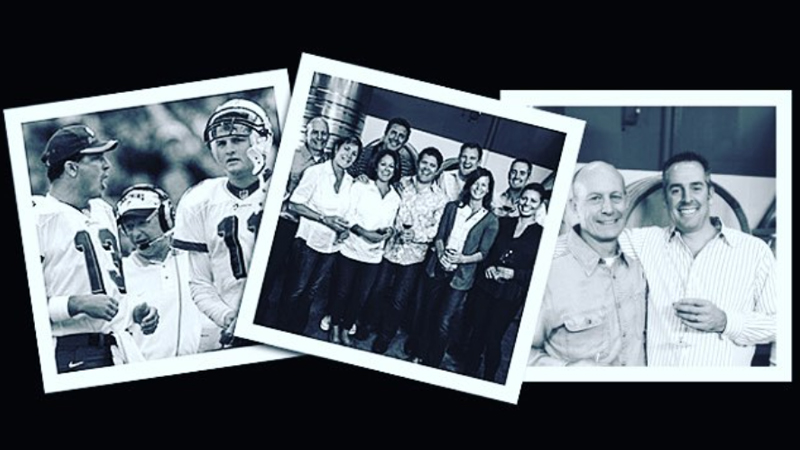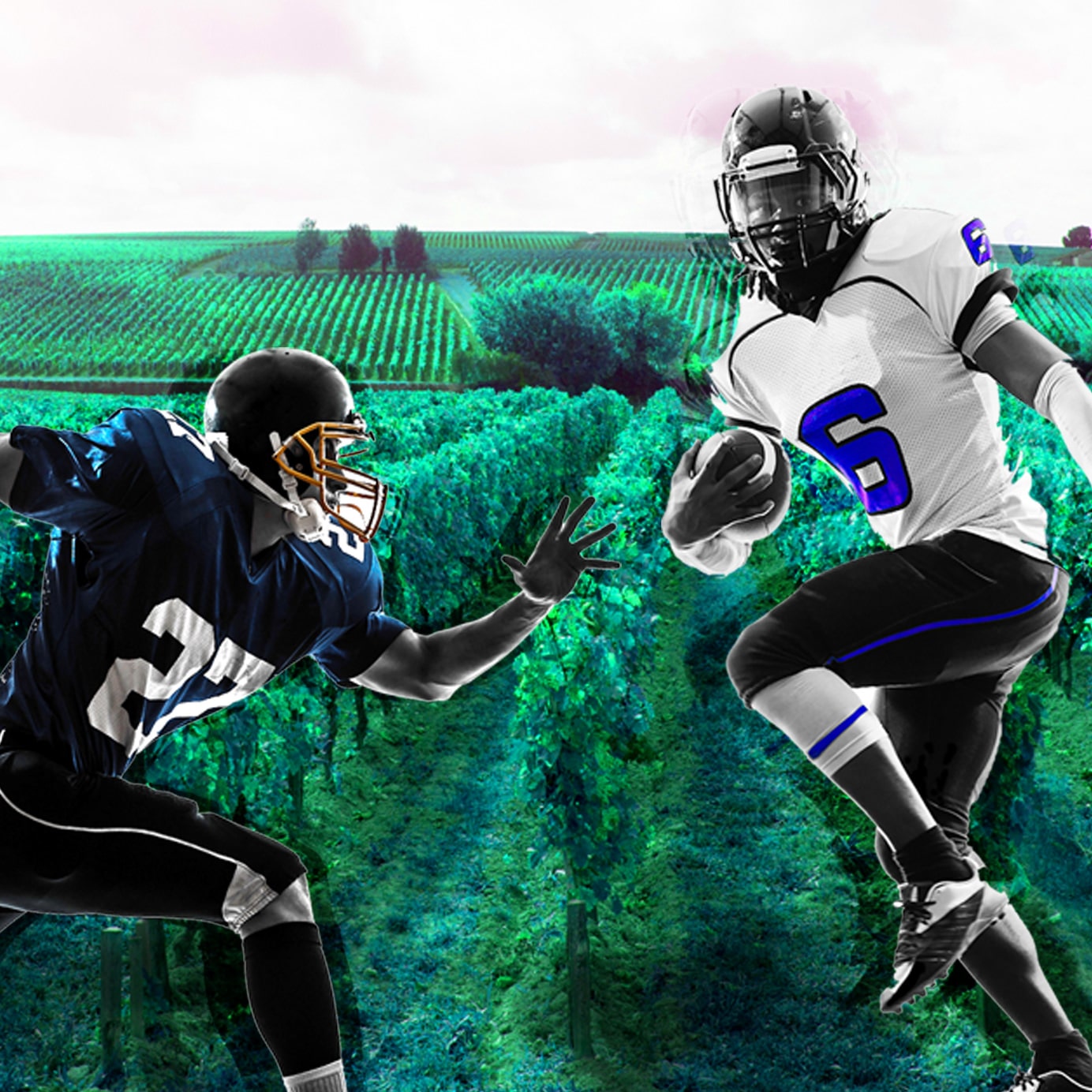In his rookie year with the Miami Dolphins, Damon Huard was taught more than just how to play quarterback in the National Football League. Sure, future Hall of Famer quarterback Dan Marino shared expertise on how to execute the playbook, but he also introduced Huard to what would become their second professional act: wine.
The two debuted their Washington winery, Passing Time, in 2011. It officially launched its first vintage, a 2012 Cabernet Sauvignon, in 2015.
Marino and Huard are among several former NFL players trading their playbooks for Pinots and Cabs. These former athletes are dedicated to their process and product, farming their land, learning the business, and, in the case of one former Super Bowl champ, building his own wine press.
These NFL alums don’t want to get pigeonholed as athletes-dash-winemakers. Their marketing efforts walk a fine line between informing consumers about their past careers — and, in some cases, celebrity — and letting the juice speak for itself.
“It was a challenge in the beginning for people to take us seriously,” Huard says. “Putting Marino’s name on a bottle doesn’t say anything about us. We’re trying to make America’s next great Cab. We are all about making the best wine we possible can.”
Drew Bledsoe agrees. “From the beginning, the goal was to have the wine accepted by the wine community, not necessarily football fans,” Bledsoe says. “They can come along for the ride, too, but we want to be a serious wine.”
Taste and Teamwork
Bledsoe, the 1993 No. 1 draft pick and former New England Patriots quarterback, founded Doubleback Winery in Washington State’s Walla Walla AVA. Doubleback debuted with a 2007 Cabernet Sauvignon, and subsequent vintages have earned critical acclaim.
“There are a few of us who are making great wine and are taking it really seriously,” Bledsoe says, naming Huard as well as Charles Woodson, Rick Mirer, and the NBA’s Dwyane Wade.
When Bledsoe was growing up in Walla Walla, Wash., he says he was “generally unaware” of any sort of wine scene in his hometown. His interest in wine began while he was playing for the New England Patriots.
“Quite a few guys on the team” liked wine, he says, so they would go to Bledsoe’s house, each armed with a bottle of wine of their choosing. Bledsoe says he would always ensure a bottle of Walla Walla-made wine made it into the mix. To his surprise, during the brown-paper-bag blind taste tests, his wines would typically win.
“It planted the seed that there was a pretty cool thing happening in my hometown,” Bledsoe says. Those taste tests, and “having a couple nickels” to spend on wine, led to wine vacations to the Napa Valley, pairing wines with dinner, and an accumulation of bottles in the wine cellar.
Over the course of Bledsoe’s football career, at Washington State University and in the NFL, Walla Walla developed into one of the country’s premier wine destinations.

Washington State’s evolution into a wine destination also inspired Huard, a Yakima, Wash., native. He recalls tasting Washington State wines with Dan Marino, who deemed them “the best value in the world,” Huard says. “He’d say, ‘Damon, you had these wines from your home state? They’re pretty good.’”
As a rookie, “I couldn’t afford them,” Huard laughs, “But, yeah, pour me some.”
Throughout his playing years, Huard says he continued to develop his palate and love of wine. He began making connections in the industry, hoping to open a winery with Marino when both of their football days were over. Passing Time was the culmination of that dream.
‘Accidental Wine Guy’
Super Bowl champion and two-time All-American Terry Hoage, on the other hand, calls himself an “accidental wine guy.”
While playing football at the University of Georgia in the early 1980s, Hoage helped the Georgia Bulldogs win a national championship. A two-time all-American, he was fifth in Heisman Trophy voting his freshman year, in 1983. He later became one of the great defensive players of his era, winning the Super Bowl with the Washington Redskins in 1992. He retired in 1996.
Looking to make a fresh start for his family, Hoage tried his hand at everything from construction to investment banking in his post-NFL career. Eventually, the Hoage family settled in Paso Robles, Calif. At the time, the Central Coast of California had under 100 wineries. There are now over 300. Hoage says he “discovered there were a lot of grapes grown here, and a lot of people make their living that way.”
As the story goes, Hoage found himself looking at a 26-acre plot with a friend, winemaker Justin Smith, who encouraged him to take the plunge. Hoage bought the land and began work on his eponymous winery, TH Estate Wines.
Because being a former NFL player doesn’t necessarily denote fabulous wealth — Hoage says he made about $2.6 million over the course of his career — he opened TH with a DIY attitude. He designed the vineyard and its irrigation system. “I built a lot of my equipment,” Hoage adds. “I built my press for 20-something thousand dollars. It’s a $70,000 press.”
After a two-year unofficial apprenticeship under Smith at SAXUM Vineyards, and a year of winemaking at the SAXUM facility, TH Estate Wines “has been cruising along since 2005,” Hoage says. He runs the winery with his wife, Jennifer; they were named “Top New California Wine Producers” by Wine Spectator in 2009.
Art and Commerce
Players aren’t the only NFL alums getting into the wine business, either. Super Bowl-winning coach Dick Vermeil has an eponymous California label with tasting rooms in Napa and Calistoga, Calif. Former San Francisco 49ers executive Carmen Policy has a highly regarded winery in Yountville, Calif., called Casa Piena (Italian for “full house”).
“When you come from northeast Ohio in an Italian-American neighborhood, every household made wine,” Policy says. “After Sunday Mass, there’d always been a noon meal and we were always served some wine with the meal. We viewed it as what went with the food. It wasn’t thought of as drinking.”
Policy moved to Northern California in 1977 and promptly fell for both the area and its wines. “The wine was a whole different category” in Northern California, Policy says. “And the more you learn and explore [wine], the more interested you become.”
Bledsoe agrees. “The more you learn about it, you realize how much more there is to learn,” he says.
Competitive Edge
Many gridiron-to-grapevine labels are proving remarkably successful. Casa Piena was one of the first non-French wines to be served at the Louvre. Critic Jeb Dunnuck scored Bledsoe’s 2015 Doubleback 94, and Huard’s Passing Time a 97.
Huard and Bledsoe welcome the return to competition. Their paths crossed several times during their playing days: Huard for the Miami Dolphins, Bledsoe the signal caller for the AFC East rival Patriots. In the 2001 season, they shared the Patriots’ locker room. They even overlapped a couple of years at the collegiate level, with Huard at the University of Washington and Bledsoe at Washington State University.
“I remind Drew that wine is purple, not crimson,” says Huard, in reference to their alma maters’ respective colors.
“There is competition,” Bledsoe says, deftly swerving around Huard’s jab. “It’s different than in football. In order for me to win, the other team has to lose. In wine, it benefits us as a business if our neighbors are making great wine. It benefits us if every Walla Walla wine is excellent.”
In other words, every great winery in each region raises the tides.
“It’s not like football,” Hoage says. “There’s no definitive answer. After 60 minutes of football, there’s a winner or a loser. In the wine world you don’t know if you’re losing. You don’t know if you’re winning. All you know is what you’re doing. We try not to chase after scores. We try to make solid wines that I like to drink. Or that my wife likes to drink.”
“This is a very competitive business and its a challenge to stand out,” Mirer says. The former record-setting Notre Dame quarterback played for the Seattle Seahawks and Chicago Bears, among others, and was the No. 2 pick behind Bledsoe in the 1993 draft. He now co-owns Mirror Wines in the Napa Valley. “The hard work we are putting in is getting us to where we want to go,” he says.
Policy sees certain similarities with his front-office NFL career. “You have the roots planted,” he says, “And there’s a new crop of fruit. Let’s see how it turns out. Is it of good quality or is it kind of just thin and light and tasteless? You gotta pick the right team. You gotta come up with a game plan.”
Game Day Goods
Huard doubts premium wine will become part of the game day experience outside of the luxury seating. Hoage, however, does note that sometimes Georgia Bulldogs fans come to Passing Time’s wine tasting room dressed in black and red, “ready for a college football game.”
“We definitely get a few people showing up in Marino jerseys at our release parties,” Huard says.
“There are so many parallels between quarterbacking a football team and running a business. You gotta have a great team around you,” Bledsoe says. “As a quarterback, if I had a really good team around me, I was going to be successful. You spend so much time planning, but then you have to go execute on that plan. In both instances, something can come up that’s unforeseen.
“You can plan and plan and plan, but then you have to adapt on the fly, just like we do in sports,” Bledsoe says.
